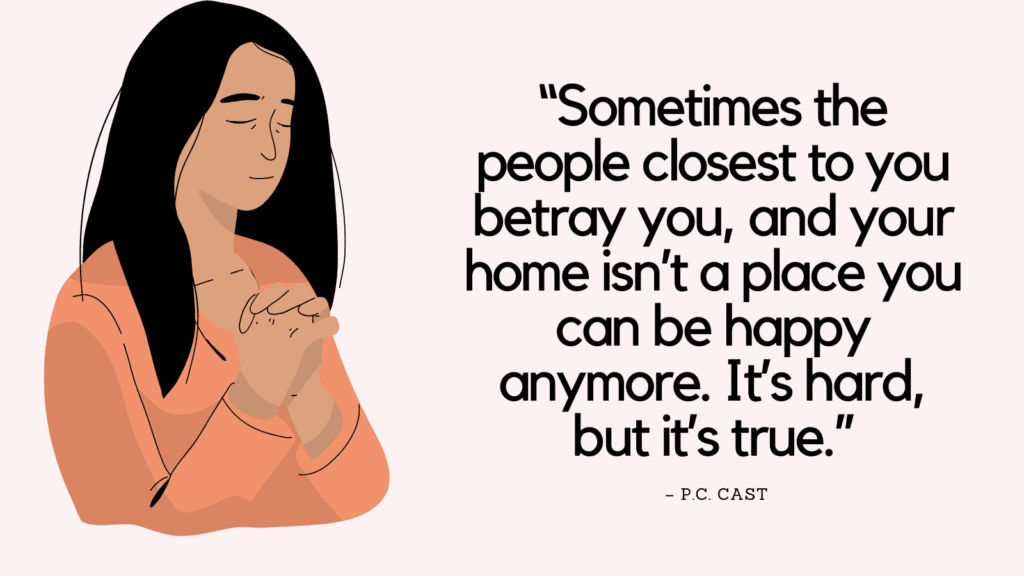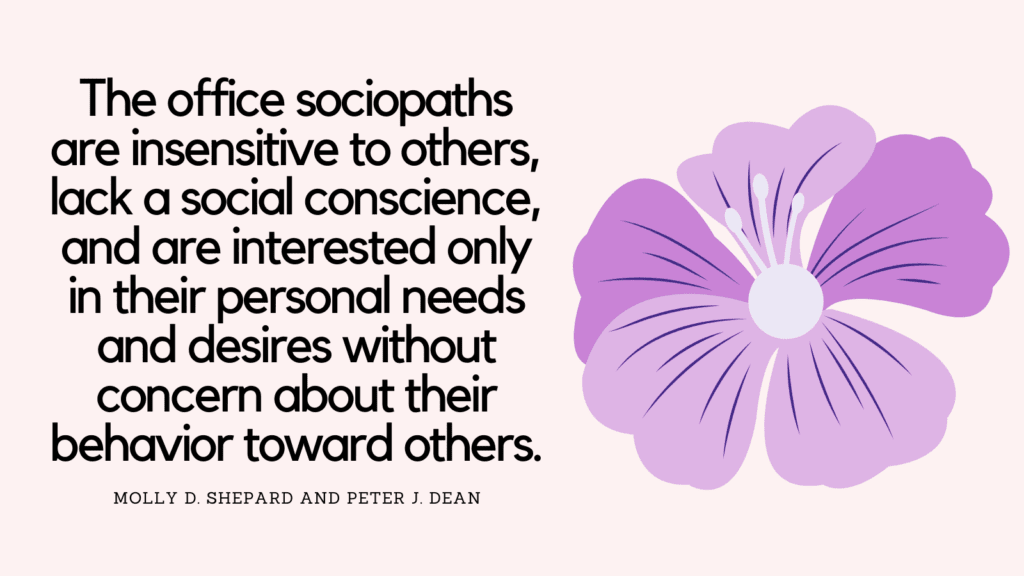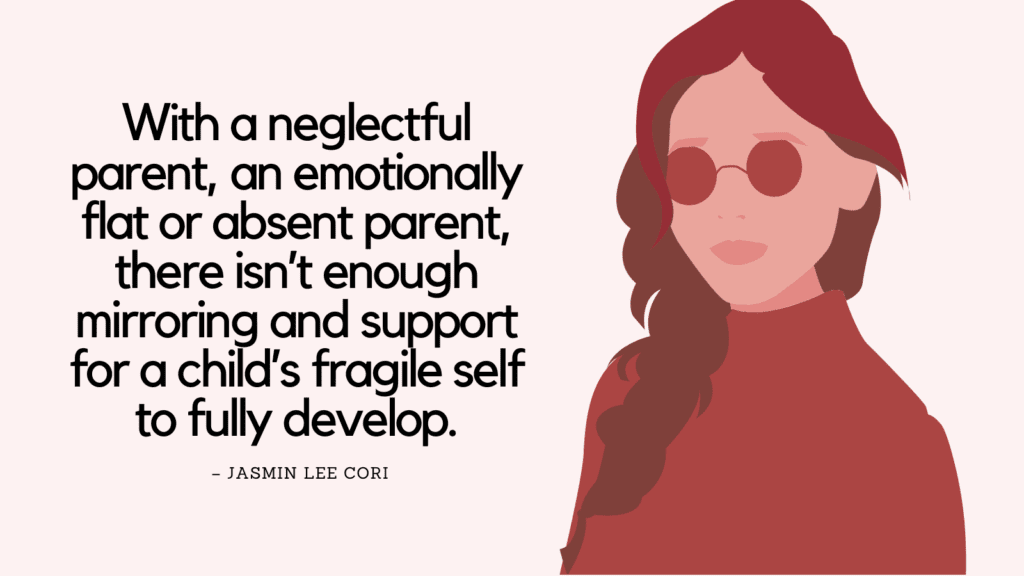This post contains some of the best family betrayal quotes.
What Is Betrayal?
Betrayal is the act of breaking trust or going against loyalty that one has promised to another person.
It can take many forms, including lying, cheating, deceiving, stealing, or breaking promises.
Betrayal can cause emotional pain, feelings of disloyalty, and a loss of trust in the person who betrayed you.
It can occur in personal relationships, business partnerships, or any situation where trust and loyalty are expected.
Family Betrayal Quotes
1. “Sometimes the people closest to you betray you, and your home isn’t a place you can be happy anymore. It’s hard, but it’s true.” – P.C. Cast
2. “You don’t know hate until your own family comes against you.” – Unknown
3. “You are allowed to walk away from people that constantly hurt you.” –Bynnada
4. “They say family’s first, but family is the first to get you hurt.” – Chrisper Malamsha
5. “They burned the bridge, then ask why I don’t visit.” – Unknown
6. “The saddest thing about betrayal is that it never comes from your enemies.” – Unknown
7. “Sometimes when the people you love hurt you the most. It’s better to stay quiet because, if your love wasn’t enough… Do you think your words will matter?” – Unknown
8. “Sometimes family was the cruelest form of love there was, for no one could hurt you more than the people who created you.” – SC Stephens
9. “Some people in your family will come miles to bury you, but won’t even cross a street to come support you when you are alive.” – Unknown
Related: 7 Stages Of Betrayal Trauma (+7 Tips On How To Find Peace After Betrayal)
10. “Some of the hardest people to cut off are family members. But sometimes they are the main ones that need to go…” – Unknown
11. “So, you want to sniff out imposters in your family? Just put money in the equation and see what happens.” – Samuel Zulu
12. “Nothing hurts more than being disappointed by the single person you thought would never hurt you.” – Unknown
13. “Love them from a distance. Pray for them, wish them well, but don’t allow them to abuse you.” – Kimber Waul
14. “Just because someone is ‘family’ doesn’t mean you have to tolerate lies, chaos, drama, manipulation and disrespect.” – Unknown
15. “It’s so sad that some people can lie to your face as if you are not blood-related.” – Samuel Zulu
16. “It’s not love that hurts. What hurts is being hurt by someone you love.” – Unknown
17. “It hurts the most when your own family betrays you…” – Unknown
18. “Isn’t it sad when you get hurt so much, you can finally say “I’m used to it”.” – Unknown
Related: Betrayal Trauma Test: Do I Have Betrayal Trauma?
19. “Instead of promoting healthy development, they unconsciously undermine it, often with the belief that they are acting in their child’s best interest.” – Susan Forward
20. “In my family, you can rot to hell on the inside as long as you’re flawless on the outside, which is really sick, but also hard to unlearn.” – Laura Wiess
21. “In general, the more dysfunctional the family the more inappropriate their response to disclosure. Never expect a sane response from an insane system.” – Renee Fredrickson
22. “If you’re struggling and your people are just sitting there watching you struggle, they’re not your people.” – Unknown
23. “Family… no one can hurt you as bad as they do.” – Unknown
24. “Family suppose to help family, not watch them struggle and talk about them.” – Unknown
25. “Family is supposed to be our safe haven. Very often, it’s the place where we find the deepest heartache.” – Iyanla Vanzant
26. “Family is supposed to be our haven. Very often, it’s the place we find the deepest heartache.” – Lyanla Vansant
27. “Fake family members are more dangerous than standing armies.” – Samuel Zulu
28. “Fake family is like shadows. They follow you in the sun but leave you in the dark.” – Unknown
29. “Fake family are like clouds when they disappear, the day is much brighter.” – Unknown
Related: Betrayal Blindness – What Is It & How To Overcome It?
30. “Cutting people out of my life does not mean I hate them, it simply means I respect me.” – Unknown
31. “And sometimes family hurts more than anybody else.” – Unknown
32. “All that fake and jealous family members can give you are lies, drama, and jealousy.” – Samuel Zulu
33. “A toxic family is even worse than a toxic relationship.” – Rohan Chouhan
34. “A person raised in a healthy family is equipped to live a confident and independent life; someone from an unhealthy family is filled with fear and self-doubt.” – Christina Enevoldsen
35. “A child should never feel as if they need to earn a mother’s love.” – Sherrie Campbell
Related: Best 55 Betrayal Trauma Quotes That Will Make You Feel Less Alone

36. “…for those of us who were raised in toxic family systems, the concept of home is quite different. Home equates to the creation of fear, anxiety, a lack of acceptance, and a lack of unconditional love and support. Home was the place we least wanted to be.” – Dr. Sherrie Campbell
37. “Growing up in a toxic family is a hollow, confusing, maddening, and lonely experience. When we are raised by toxic parents, we live in a unique kind of crazy where we feel more like things to manage and keep on a schedule rather than as human beings to love, nurture, and care for. We leave childhood feeling emotionally homeless.” – Dr. Sherrie Campbell
38. “We as their children don’t realize we’re being manipulated because we believe the lies our toxic family members tell us, convinced everything is our fault and that we are the ones who are broken and destroying our family members.” – Dr. Sherrie Campbell
39. “Toxic family abuse is always two-fold. The first layer of abuse is the original poor treatment by our toxic family members, namely our parents. Thee second layer is their denial of the ways in which they treat and harm us, irrespective of the evidence as it manifests in our behavior and in our tragically low levels of self-worth.” – Dr. Sherrie Campbell
40. “Our toxic family members are experts at concealing their abusive behaviors just slightly under public radar so that when we complain about the hurt they have made us feel, our complaints fall on deaf ears. This level of slyness allows our toxic family members to walk away looking innocent and unfairly accused while we appear emotionally unstable. This is the most infuriating part for us.” – Dr. Sherrie Campbell
41. “Toxic can apply to our mother, father, siblings, grandparents, other extended family members, and even our own children.” – Dr. Sherrie Campbell
42. “Family is about love, sacrifice, honesty, protection, support, unconditional love, reciprocity, acceptance, security, respect, protection, loyalty, and safety. It is not about cruelty, gang-up warfare, triangulation, manipulation, abandonment, lying, criticism, selfishness, betrayal, or gossip. When a family is full of these negative qualities, it is a family in name only” – Dr. Sherrie Campbell
43. “If our blood family is abusive, we have every right to open our heart and our life to new and healthier people capable of loving in the same ways we love. Doing this is not a betrayal. It’s our right.” – Dr. Sherrie Campbell
44. “For a toxic mother, the natural passage of their children into their independence is experienced as an act of betrayal against her. If toxic mothers are not getting the attention they crave from their children, they experience their children as inconveniences who stand in their way of doing what they want to do for themselves.” – Dr. Sherrie Campbell
45. “Sometimes rejection and betrayal hurt so much that for a while it may seem the only way to ease the pain is to destroy the person who did the cheating, along with wrecking the good name of their latest lover, your replacement— especially if your seat is still warm.” – Janise Beaumont
46. “It never ceases to amaze me how heartless some people can be, especially when they’re close to us and act shabbily, such as serious betrayal. They don’t even realise their behaviour is reprehensible!” – Janise Beaumont
47. “The lies, betrayals, and cruelties thrown at me throughout my life were so vile and calculated, I knew my only reasonable choice was to protect myself. I did not want to sever ties; I had to. It was a decision not of confidence, but of survival.” – Dr. Sherrie Campbell
48. “When you grow up in a toxic family system, it’s common to develop a deep-seated fear of people. Being emotionally abused creates a thick defensive layer around you, born of trauma and betrayal. This armor profoundly influences how you view people who desire to be closer to you. It is not that you are shy, playing hard to get, or being intentionally difficult in social situations. You are simply trying to protect yourself. You are often consumed with anxiety and worry about how others are perceiving you or misperceiving you.” – Dr. Sherrie Campbell
49. “Other sought-after messengers are the people closest to you—your spouse, ex-spouse, children, or even your closest friends. This is where the depths of betrayal can be most devastating. When your predatory family members feel entitled enough to try to use those closest to you to assert their agenda, there is nothing that will hurt you more profoundly.” – Dr. Sherrie Campbell
50. “These feelings of betrayal make it difficult to separate your loving feelings for your healthy family members from your painful feelings for your toxic family.” – Dr. Sherrie Campbell
How To Deal With Family Betrayal?
Experiencing betrayal within the family can be an incredibly painful and distressing event.
The sense of betrayal can lead to feelings of anger, sadness, confusion, and loss of trust.
However, it is possible to navigate through this challenging situation and find healing.
1. Allow Yourself to Grieve
Acknowledge and give yourself permission to grieve the loss resulting from the betrayal.
It is natural to experience a range of emotions such as anger, sadness, or even guilt.
Allow yourself time and space to process these emotions and come to terms with the impact of the betrayal.
Related: Best 8 Mindfulness Exercises For Adults That Will Help You Regulate Your Emotions
2. Seek Support from Trusted Individuals
Reach out to supportive friends, other family members, or a therapist who can provide a safe space for you to express your feelings and offer guidance.
Sharing your thoughts and experiences can help alleviate some of the emotional burden and provide valuable insights and perspectives.
3. Set Boundaries and Prioritize Self-Care
Establishing clear boundaries with the person who betrayed you is crucial for protecting your emotional well-being.
Evaluate what feels comfortable and safe for you, and communicate your boundaries assertively.
Prioritize self-care by engaging in activities that promote your mental and physical health.
This may include exercise, practicing mindfulness, or pursuing hobbies and interests that bring you joy.
Related: Top 25 Tips On How To Set Boundaries Without Being Controlling? (+FREE Worksheets PDF)
4. Practice Forgiveness, if You’re Ready
Forgiveness is a personal choice and should be approached at your own pace.
While it may not be easy, forgiving the person who betrayed you can promote healing and release emotional burdens.
However, forgiveness does not mean condoning the actions or returning to the same level of trust immediately.
It is a process that involves setting boundaries and rebuilding trust gradually.
Related: Best 12 Forgiveness Books
5. Work on Rebuilding Trust
Rebuilding trust after betrayal takes time and effort from both parties involved.
Start by having open and honest conversations with the betrayer about the impact of their actions and discussing ways to rebuild trust.
It may be helpful to seek professional guidance, such as family therapy or mediation, to facilitate this process.
6. Focus on Personal Growth
Transform the pain of betrayal into an opportunity for personal growth and self-reflection.
Take this time to reassess your values, priorities, and how you engage in relationships.
Use the experience as a catalyst for personal development, learning, and positive change.
7. Learn to Let Go
While it is essential to process the emotions surrounding family betrayal, holding onto resentment and anger can hinder your own growth and well-being.
Practice letting go of negative emotions by engaging in forgiveness exercises, journaling, or seeking professional help to work through any unresolved emotions.
Related: Best 21 Forgiveness Journal Prompts (+FREE Worksheets PDF)
8. Create a Supportive Network
Surround yourself with individuals who genuinely care about your well-being and provide a supportive network.
Engage in healthy relationships outside of your immediate family, such as friendships or support groups, to create an additional source of emotional support and connection.
9. Find Meaning and Purpose
Engaging in activities that have personal meaning and purpose can help redirect your focus and foster a sense of fulfillment.
This may involve volunteering, pursuing a new hobby or interest, or dedicating time to personal growth and self-improvement.
10. Practice Self-Reflection
Take the opportunity to reflect on your own role within the family dynamics and assess whether there are any patterns that contributed to the betrayal.
Engaging in self-reflection can aid in personal growth and prevent future instances of betrayal.
Related: Lack Of Self Awareness: 5 Signs & 5 Tips On How To Increase Self-Awareness

Conclusion
Dealing with family betrayal is a challenging and complex process.
By acknowledging your emotions, seeking support, setting boundaries, and working towards rebuilding trust, you can begin to heal and find emotional well-being.
Remember, everyone’s journey is unique, and seeking professional help may be beneficial in navigating through this difficult period.
With time, self-care, and gradual steps towards forgiveness and rebuilding, it is possible to move forward and create healthier relationships within your family and beyond.



